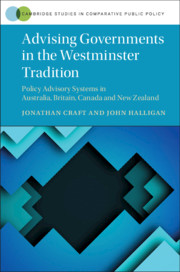 Advising Governments in the Westminster Tradition
Advising Governments in the Westminster Tradition Book contents
- Reviews
- Advising Governments in the Westminster Tradition
- Cambridge Studies in Comparative Public Policy
- Advising Governments in the Westminster Tradition
- Copyright page
- Dedication
- Contents
- Figures
- Tables
- Acknowledgements
- Glossary and Acronyms
- 1 Policy Advisory Systems
- 2 Comparative Contexts
- 3 Approaches to Understanding PAS and Change over Time
- 4 Public Services and Policy Advice
- 5 Ministerial Partisan Advisers and the Politicisation of PAS
- 6 Alternative Advice from within Government
- 7 External Advice
- 8 Understanding Westminster PAS Change
- 9 Trends, Tensions and the State of Neo-policy Advisory Systems
- Book part
- Notes
- References
- Index
6 - Alternative Advice from within Government
Published online by Cambridge University Press: 18 December 2020
- Reviews
- Advising Governments in the Westminster Tradition
- Cambridge Studies in Comparative Public Policy
- Advising Governments in the Westminster Tradition
- Copyright page
- Dedication
- Contents
- Figures
- Tables
- Acknowledgements
- Glossary and Acronyms
- 1 Policy Advisory Systems
- 2 Comparative Contexts
- 3 Approaches to Understanding PAS and Change over Time
- 4 Public Services and Policy Advice
- 5 Ministerial Partisan Advisers and the Politicisation of PAS
- 6 Alternative Advice from within Government
- 7 External Advice
- 8 Understanding Westminster PAS Change
- 9 Trends, Tensions and the State of Neo-policy Advisory Systems
- Book part
- Notes
- References
- Index
Summary
Internal non-public service sources of policy advice cover parliamentary committees, public inquiries and other bodies that operate within the broader public sector. Some units have substantial independence, while others may be at the beck and call of ministers. The spectrum ranges from bodies located within government with permanent standing to those existing under ad hoc arrangements that may include external actors. Advice is distinguished by whether it is solicited or not, the former being commissioned by government (e.g. taskforces) and the latter being about the capacity to influence policy. Three categories of alternative policy advice within government are independent policy advisory bodies; agencies that report to parliament rather than the executive; and ad hoc entities that operate as extensions to government and comprise a range of government appointed inquiry forms.Each has changed with implications for the policy advisory system, although depoliticisation and politicisation are factors. The institutionalisation of independent standing bodies is notable. The trend to flexible instruments has allowed governments to reduce reliance on formal and independent public reviews. The expansion and contraction of alternative sources of advice has occurred over time and varies between countries, but the broad trends have been similar.
Keywords
- Type
- Chapter
- Information
- Advising Governments in the Westminster TraditionPolicy Advisory Systems in Australia, Britain, Canada and New Zealand, pp. 113 - 133Publisher: Cambridge University PressPrint publication year: 2020


